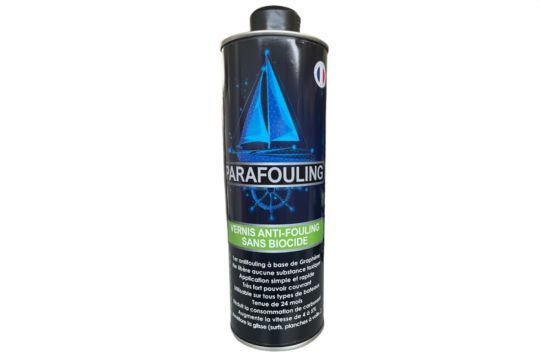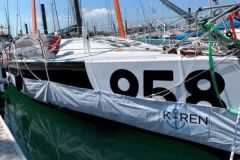Prisme is a new player in the highly competitive antifouling coatings market. This French company based in Auvergne for 10 years has a chemist in love with the boat. Far from the sea, Prisme's main field of expertise is in building products, with innovative solutions that fit in with sustainable development. With ecology in mind, it has developed an engine additive based on the incredible characteristics of graphene. And it is precisely by working on this component that it has developed Parafouling.
A graphene-based antifouling
Parafouling is composed of graphene encapsulated in a kind of resin. It is neither an epoxy resin, nor a polyester resin, but what we could call a mineral polymer after reaction. It can be classified in the family of grafted silicates. To simplify, one could speak of a silica gel or "liquid glass". When drying, the silicate molecules will graft to each other to form a crystalline network. The product, once dry, forms a totally impermeable and waterproof coating. In the end, it is like a "vitrification" of the hull.
A transparent antifouling varnish

Indeed, Parafouling is a kind of transparent varnish, which is applied to all surfaces in a very thin film. The covering power is 30 to 40 m2 per liter. And it requires only one coat. It is applied with a microfiber cloth or a foam roller. Thus, a 750 ml bottle can cover the hull of a boat of 12 to 14 m. Ideally, it is applied on a new hull, but it will also be possible, by removing the old coats of antifouling, to apply Parafouling on a used boat as part of a refit.
An eco-friendly product
In the absence of biocide, this product does not harm the surrounding fauna. Encapsulated in its "resin", it does not release anything into the water. Its surface is so hard that no bacterial film adheres to it. It is therefore understandable that you have to sail to clean your hull, and that a simple sponge stroke is enough to give it back its original aspect.
For the moment, Prisme announces a lifespan of 2 years without applying a new layer of product. It announces this period for lack of longer testsâeuros¦ 750 ml of product are for sale 330 euros HT. That is about the price of 2 coats of a traditional antifouling, but which is supposed to last twice as long.









